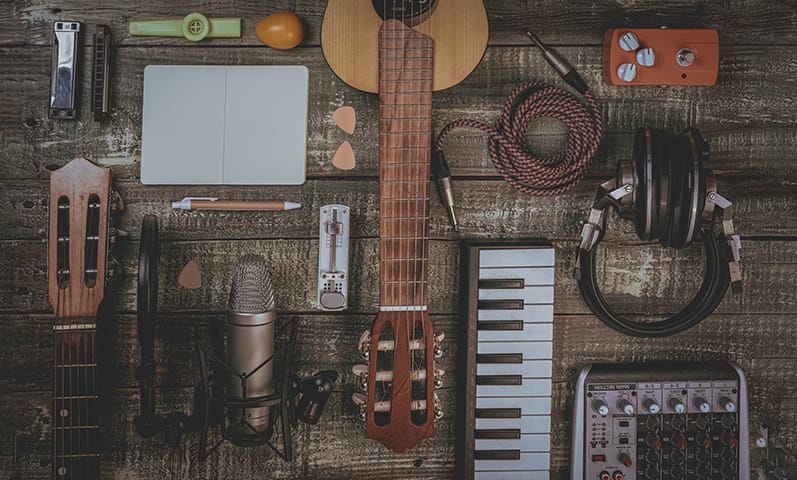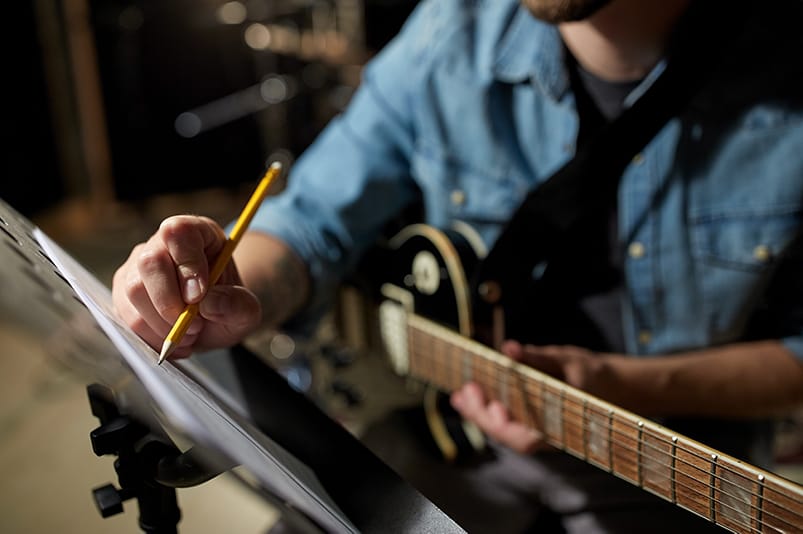Can't Compose But Want To Create New Music? 5 Options For Finding The Right Collaboration
GUEST POST - Composing music on your guitar may sound like a difficult task, but it can be easier than you think, at least, with some help. Anyone with musical talent and the ability to play chord progressions can easily create their own music. It seems intimidating to try and create music on your own, but the task doesn’t have to be daunting.
There are many ways to collaborate and utilize technology to assist you in composing brand new, unique music that suits your style and reflects you as a musician. Since the guitar is one of the most popular instruments for beginners and people to learn on, you can create compositions as simple as playing three or more chords with a certain strum or fingerstyle.
But how do you find the right music and style for you? How can you compose on your own?
We will explore five different ways and steps to take to make playing the guitar and creating your own brand of music through various avenues.
1. Identify Your Personal Musical Style

The first and most important thing that you can do for yourself is to identify your playing and musical style. Do you prefer to play the blues on your guitar, do you enjoy riffs, or more coffeehouse or acoustic type music? Do you enjoy the lyrics of alternative rock, or feel compelled to learn more complicated fingerstyle guitar? Ask yourself some questions to get you in the right mindset for the type of music that you wish to create.
Some questions can be as simple as - What do I want people to feel when I play? The emotion behind what you play can be as important as the creation of the music itself. Maybe you’d rather motivate your audience so that they feel powerful enough to do anything. Or maybe you’d like to move them to tears.
No answer is wrong here, so just explore and make sure to write down the ideas you have for what you plan to accomplish with your music.
2. Write, Write, Write Some More

Composing requires writing. Writing down something may seem trivial when it’s all in your head and you just want to play it out, but it is important to establish yourself by recording all of the thoughts and feelings you have. In addition to the ideas, whether it’s lyrics, tunes, chords, etc. be sure you get all your ideas down on paper. Writing is the most important part of composing.
Since emotions play a large part, think about taking notes on some important events that have happened throughout your life. Many great musicians draw on their own personal experiences for inspiration and create beautiful compositions from them.
3. Musical Composition Structure

If you know how songs are mainly set up, then you have a good idea of how to compose one. The composition requires some basic knowledge of music theory, key signatures, and notes. If you’re unfamiliar with these it may benefit you to take some beginner guitar lessons so that you can brush up on all of the musical terms to feel more comfortable before you start composing.
The song structure is the next step to putting all of that musical knowledge to use. Most songs consist of a melody, which is usually the chorus, around 2 verses that may or may not have harmony, and then a “bridge” or “interlude” that is typically viewed as the climax of the song, usually ending back with the last chorus. You can play around with the order of things, but keep in mind you should be thinking about all of the elements that go into music-making: rhythm, lyrics, melody, and harmonies.
4. Work With and Get Feedback From Other Musicians

Discussing your work with others may make you feel vulnerable, and that is okay. It is completely understandable for you to feel guarded and not want to share your ideas, either because you have doubts that they aren’t “good enough” or you’re afraid of the type of criticism you may receive from others.
However, it is important to rely on other musicians and writers for feedback. Your audience, even! Make sure to reach out and get some collaborating on how lyrics flow, or how a song sounds, if it makes sense and if it evokes the proper emotion that you’re going for. You won’t know until you reach out and ask for feedback.
That being stated, be sure you look to others for feedback who can give you constructive and helpful criticism, rather than anyone who might just bring you down. It is essential that your creative juices not be squashed in the process, and that you don’t lose momentum in your composing because someone was just being mean and giving you unhelpful feedback. Other musicians who compose are your best help because they have been where you are and know what to say to help you along.
5. Work With An Agency

In addition to asking other musicians and getting feedback, consider collaborating with professional resources. For example, agencies like Marmoset, a custom music production studio, hire artists to provide the music for the custom scores that they develop for brands. This provides a great opportunity for artists to create brand new music and be involved in the creative process without the pressure of composing a new piece themselves. Custom music production companies often partner with brands to create tunes to be used in advertisements, so this also can prove as a great opportunity for promoting your talent once the custom track is “out in the world.” Partnering with a company that’ll work on composing the song for or with you is a great way to learn and develop your skills if you feel you aren’t strong enough in your own composition. Though taking what you learn from a partnership like this should allow you to begin trying your hand at your own pieces!
Keep your creative juices flowing, and remember to collaborate, keep writing, utilize professional resources, and ask for feedback so that you can continue to draw in your audience. Give it a try and start composing and creating your very own music today!
